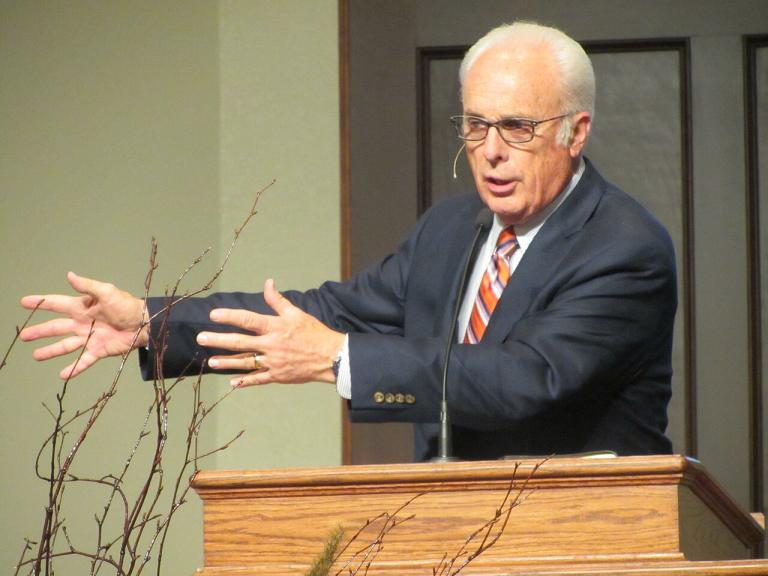
A couple months ago, I tweeted out an awful story about a young man who committed suicide after going on a course of citalopram, an anti-depressant. He received this prescription over the phone, and within a week, his anxiety had spiked dramatically. Unable to cope, he took his own life.
I had forgotten all about this story until a few days ago, when a young Christian reader of mine sent a message reminding me of it. He told me he had just narrowly avoided the very same fate, with the very same drug.
We have a problem here. So how do we talk about it?
A couple weeks ago, John MacArthur drew sharp criticism for suggesting, in the course of a panel discussion about faith and culture and family, that the whole category of “mental illness” is a fiction. A noble lie. A Big Pharma fairytale, designed to keep people coming back for the drugs they never needed. “There’s no such thing as PTSD, there’s no such thing as OCD. There’s no such thing as ADHD. Those are noble lies to basically give the excuse, at the end of the day, to medicate people.”
When I say MacArthur “drew criticism” for this take, I mean that absolutely no one liked this take. I mean that everyone from Rachel Held Evans’ sister to the Boniface Option guy came out to say this was a bad, bad take. I noticed that people were especially incensed by MacArthur’s inclusion of PTSD, which makes sense given that it sits at the intersection of sexual trauma and veteran trauma. For one fleeting moment, there was something both #ChurchToo Twitter and redpilled masculinist Twitter could shake hands and agree on. It was fleeting, but it was a moment.
I thought of putting out a hot take of my own, but I decided to let it bake, which will no doubt cost me views now. But I still think it’s worth coming back to say something. Before I proceed, I’ll say that this isn’t an abstract discourse for me. I’ve known many people who struggle with all kinds of mental illness. I’ve known people who were suicidal, including multiple men of all ages who attempted it, and one who succeeded. I know people who live daily with the burdens of depression, OCD, and chronic anxiety.
So, yeah. I kind of care about all this. So here’s my take, served cold.
The first thing I noticed, which no one else seemed to pick up on, was that MacArthur wasn’t pointing to Christian sources when he made these comments. He cited two books by secular psychiatrists: Thomas Szasz’s The Myth of Mental Illness (1950) and Bruce Levine’s A Profession Without Reason (2013). Levine’s book hasn’t generated much discussion, but it’s in a similar vein to Szasz’s book, which was widely read and praised as a seminal work by prominent figures like Karl Popper. Its bold attack on the pharmaceutical establishment would inspire followers who found their place among fellow anti-establishmentarians in the roiling 60s. This was a time when institutions of all kinds were losing unconditional deference, Big Pharma no less than Big Religion, Big Corporate, and Big Military. Levine makes the parallel to religion quite explicit in his book, which is constructed around the life and thought of Baruch Spinoza. Just as Spinoza questioned the sayings of the Bible, so Levine argues that we should question the sayings of Big Pharma. These sayings may present themselves as “science,” but Levine suggests they’re more like alchemy.
Such writers might seem like unlikely bedfellows for a revered evangelical pastor like John MacArthur, especially since their argument relies on materialist presuppositions. I’m not sure MacArthur actually realizes this. Watching a sermon where he expands on his remarks, I’m struck by a bit where he emphasizes that the only things he classifies as “illness” are things you can point to physically in someone’s brain. He uses the word “objective” here—things you can observe and diagnose “objectively.” But this seems to concede the materialist’s assumption that “objective” = “physical.” If you cut open a person’s brain, you wouldn’t find his soul either, yet I assume MacArthur believes his soul exists.
But I think MacArthur is intuitively drawn to these writers because all of them share an anti-establishment spirit. They simply differ on which establishments are worth attacking. They start from a similar place, then branch off in different directions. To give one especially interesting example from Levine’s book, Levine discusses the history of homosexuality as a mental illness. As homosexuality gradually became normalized, people realized the absurdity of including it in the DSM-5. Today, nobody even thinks about rolling back the clock. This is on Levine’s way to the argument that a similar revolution needs to happen with other things currently classified as mental illness, like schizophrenia.
Now, MacArthur is obviously not going to agree with Levine that homosexuality should be normalized. But I think he would agree that it shouldn’t have been classified as a mental illness. He would just call it sin.
And this is where so many people were coming out to hammer MacArthur, because applying a framework of sin to all kinds of mental illness has caused so much turmoil in the church. In fairness, he doesn’t chalk everything up to sin. When discussing PTSD, he tries to show sympathy for the struggling veteran who’s lost friends. MacArthur just wants the veteran to understand that what he’s experiencing is “grief” — no more, no less. It isn’t its own distinctive thing that needs an acronym or needs any special treatment beyond what we would normally suggest to people dealing with grief.
Here some veterans in the audience might dryly comment, “Ah, so that’s why I keep waking up in the night trying to strangle my wife!”
I myself am hardly an unquestioning acolyte at the altar of Big Pharma. I don’t nod my head meekly at every single new diagnostic acronym they create. To pick another one in MacArthur’s list, I myself have wondered how much there really is to ADHD. There’s certainly a conversation to be had about how many little boys were put on Ritalin for acting like…well, like little boys. I have similar questions about things like narcissistic personality disorder. Is this really a “disorder,” or have we just invented a medical category for the condition otherwise known as “being an asshole”?
To give a more recent example where I was completely on MacArthur’s side against both Big Pharma and Big Government, I took lots of flak during the pandemic for questioning the various mantras our overlords handed down to us. I also questioned the haste and safety of the vaccine rollout. I think time has borne me out on all of these questions, as it’s borne out MacArthur for refusing to close his church. I thought, and still do think, that this choice embodied anti-establishment resistance at its best.
Still, I wonder if MacArthur’s anti-establishmentarianism in this area might in some sense spring from the same source as his mental illness denialism. To question the latter is not to say that the establishment is always right, nor even to say that they offer all the best ways of handling mental illness. There’s my friend, after all, with his depression and his citalopram. However, I think that such stories function as double-edged swords. To be sure, they do cut against the hasty over-prescriptions of Big Pharma. But they’re also in tension with cavalier pronouncements against the very idea that body and mind and spirit all interact with each other, and that chemical imbalances in the brain can dramatically affect whether we love life or would rather not go on living.
A powerful recent book on this topic, which I’ve given away to multiple people, is John Andrew Bryant’s A Quiet Mind to Suffer With, a memoir intimately chronicling Bryant’s painful journey through OCD. I could quibble with a few things about the book, but as a whole I think it stands as a very important corrective to blanket mental illness denialism. Bryant is a devout Christian, yet he finds himself afflicted by dark, strange thoughts that he simply can’t control. With much time, prayer, and effort, he’s learned to live with them, but he’s never been able to banish them entirely. He makes a vivid analogy to going shopping with a screaming toddler in tow. The toddler is screaming, he’s trying to make sure you get no shopping done today, but you have to tuck him under your arm and say, “Nope. We’re going shopping.” And even though he’s still screaming, you will get your shopping done. But he never stops screaming.
It’s been rightly pointed out that MacArthur is vulnerable to the accusation of prosperity gospel-ism here, with his inflexible insistence that if you would just pray harder and practice better spiritual discipline, you could eliminate these things. Someone found an old clip where MacArthur even sounds incredulous when responding to John Piper’s humble confession of a years-long depression. “It lasted several years??” MacArthur asks, while the audience laughs. The concept seems entirely foreign to him. He’s never experienced it, he has no category for it. One would have hoped that a story like Piper’s might inspire MacArthur to reassess, but apparently it didn’t.
All that being said, Christians do have a tightrope to walk here, because sin and sickness, if we are brutally honest, are often tangled together in dark and complex ways. Consider autism. The evidence is simply incontrovertible that autism is a Thing. It’s real, it has very clear symptoms that can be tracked and assessed on a scale of severity, it’s not just something made up by some shadowy Big Pharma exec with too much time on his hands. If you doubt this, there are many, many parents who would be glad to inform you otherwise. On the other hand, people suffering with autism aren’t just sufferers. They can also be perpetrators of great hurt to the people around them. That’s not sickness. That’s sin. Is the sin in some sense connected to the sickness? In a way, yes, in the sense that autism heightens certain sensitivities, lowers impulse control, and so on. But plenty of people with this condition have found ways to recognize it, manage it, and not mistreat their friends and loved ones. It doesn’t mean they have no such thing as autism. It just means they’re dealing with their autism in non-sinful ways.
The same applies to any number of “things with acronyms.” The veteran with PTSD (sickness) can choose to drown himself in alcohol and become a wife-beater (sin), or he can choose to seek help, which should include seeking God, but may well also include seeking a good therapist. Once again, I am no fan of much that trots itself out in the guise of “therapy” these days. Therapy is a tool as good or as bad as the man using it. Lots of bad men are using it. That doesn’t mean it can’t be a good tool.
I’m sure I’m preaching to the choir here. MacArthur is clearly in a small minority. But I hope I’ve made a reasonable attempt to understand him fairly, while acknowledging that this isn’t just MacArthur’s random harmless musings. This reflects a whole system of dealing with real people’s real problems that has caused real pain. Nor, as I’ve sometimes wondered, is it merely a generational divide. Younger pastors in MacArthur’s tribe operate according to these assumptions too. I don’t blame people for being angry about this. At the same time, I don’t blame other people for wanting to honor the good work MacArthur has still done. Just the other day, my friend Meg Basham was giving MacArthur credit for opening her eyes to the gospel when she was still mired in a decadent sorority girl lifestyle. I praise God for that. I hope you can too. Legacies are complicated, and John MacArthur’s will be no different.
But on this issue, this one time, in Christian and ex-Christian unity, we can all agree that he’s wrong.













